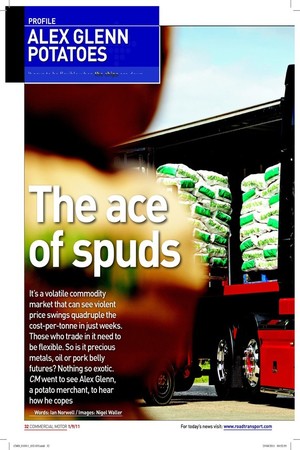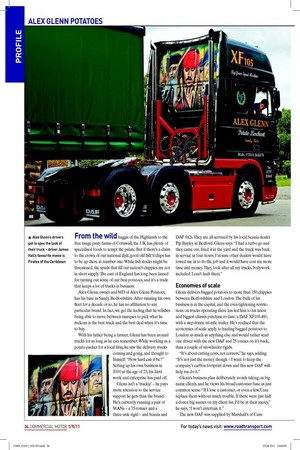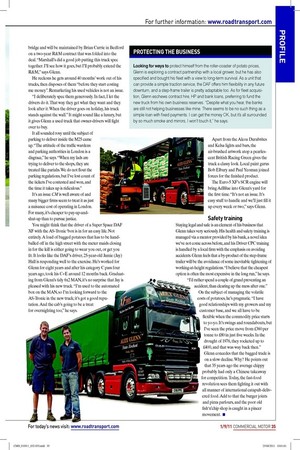The ace of spuds
Page 27

Page 29

Page 30

If you've noticed an error in this article please click here to report it so we can fix it.
It’s a volatile commodity market that can see violent price swings quadruple the cost-per-tonne in just weeks. Those who trade in it need to be flexible. So is it precious metals, oil or pork belly futures? Nothing so exotic. CM went to see Alex Glenn, a potato merchant, to hear how he copes
Words: Ian Norwell / Images: Nigel Waller
From the wild haggis of the Highlands to the free range pasty farms of Cornwall, the UK has plenty of specialised foods to tempt the palate. But if there’s a claim to the crown of our national dish, good old ish‘n’chips has to be up there at number one. While ish stocks might be threatened, the spuds that ill our nation’s chippies are not in short supply. The east of England has long been famed for turning out some of our best potatoes, and it’s a trade that keeps a lot of trucks in business.
Alex Glenn, owner and MD of Alex Glenn Potatoes, has his base in Sandy, Bedfordshire. After running his own leet for a decade or so, he has no afiliation to any particular brand. In fact, we get the feeling that he relishes being able to move between marques to pick what he reckons is the best truck and the best deal when it’s time to buy.
With his father being a farmer, Glenn has been around trucks for as long as he can remember. While working as a potato packer for a local irm, he saw the delivery trucks coming and going, and thought to himself: “How hard can it be?” Setting up his own business in 2000 at the age of 23, his hard work and enterprise has paid off.
Glenn isn’t a ‘truckie’ – he pays more attention to the service support he gets than the brand. He’s currently running a pair of MANs – a 7.5-tonner and a three-axle rigid – and Scania and DAF 6x2s. They are all serviced by his local Scania dealer Pip Bayley in Bedford. Glenn says: “I had a turbo go and they came out, ixed it in the yard and the truck was back in service in four hours. I’m sure other dealers would have towed me in to do the job and it would have cost me more time and money. They look after all my trucks, bodywork included. I can’t fault them.”
Economies of scale
Glenn delivers bagged potatoes to more than 150 chippies between Bedfordshire and London. The bulk of his business is in the capital, and the ever-tightening restrictions on trucks operating there has led him to his latest and biggest chassis purchase to date: a DAF XF105.460, with a step-frame tri-axle trailer. He’s realised that the economies of scale apply to hauling bagged potatoes to London as much as anything else and would rather send one driver with the new DAF and 25 tonnes on it’s back, than a couple of six-wheeler rigids.
“It’s about cutting costs, not corners,” he says, adding: “It’s not just the money though – I want to keep the company’s carbon footprint down and this new DAF will help me do it.” Glenn’s business plan deliberately avoids taking on big name clients, and he views his broad customer base as just common sense. “If I lose a customer, or even a few, I can replace them without much trouble. If there were just half a dozen big names on my client list, I’d be at their mercy,” he says. “I won’t entertain it.” The new DAF was supplied by Marshall’s of Cam bridge and will be maintained by Brian Currie in Bedford on a two-year R&M contract that was folded into the deal. “Marshall’s did a good job putting this truck spec together. I’ll see how it goes, but I’ll probably extend the R&M,” says Glenn.
He reckons he gets around 40 months’ work out of his trucks, then disposes of them “before they start costing me money”. Remarketing his used vehicles is not an issue.
“I deliberately spec them generously. In fact, I let the drivers do it. That way they get what they want and they look after it. When the driver goes on holiday, his truck stands against the wall.” It might sound like a luxury, but it gives Glenn a used truck that owner-drivers will ight over to buy.
It all sounded rosy until the subject of parking to deliver inside the M25 came up. “The attitude of the trafic wardens and parking authorities in London is a disgrace,” he says. “When my lads are trying to deliver to the shops, they are treated like pariahs. We do not lout the parking regulations, but I’ve lost count of the tickets I’ve contested and won, and the time it takes up is ridiculous.” It’s an issue CM is well aware of and many bigger irms seem to treat it as just a nuisance cost of operating in London. For many, it’s cheaper to pay-up-andshut-up than to pursue justice.
You might think that the driver of a Super Space DAF XF with the AS-Tronic ‘box is in for an easy life. Not entirely. A load of bagged potatoes that has to be handballed off in the high street with the meter maids closing in for the kill is either going to wear you out, or get you it. It looks like the DAF’s driver, 25-year-old Jamie (Jay) Hall is responding well to the exercise. He’s worked for Glenn for eight years and after his category C pass four years ago, took his C+E around 12 months back. Graduating from Glenn’s tidy 6x2 MAN, it’s no surprise that Jay is pleased with his new truck. “I’m used to the automated box on the MAN, so I’m looking forward to the AS-Tronic in the new truck; it’s got a good reputation. And the cab’s going to be a treat for overnighting too,” he says. Apart from the Alcoa Durabrites and Kelsa lights and bars, the air-brushed artwork atop a pearlescent British Racing Green gives the truck a classy look. Local paint gurus Bob Elbury and Paul Yeoman joined forces for the inished product.
The Euro-5 XF’s SCR engine will bring AdBlue into Glenn’s yard for the irst time. “It’s not an issue. It’s easy stuff to handle and we’ll just ill it up every week or two,” says Glenn.
Safety training
Staying legal and safe is an element of his business that Glenn takes very seriously. His health and safety training is managed via a mentor provided by his bank, a novel idea we’ve not come across before, and his Driver CPC training is handled by a local irm with the emphasis on avoiding accidents. Glenn feels that a by-product of the step-frame trailer will be the avoidance of some inevitable tightening of working-at-height regulations. “I believe that the cheapest option is often the most expensive in the long run,” he says.
“I’d rather spend a couple of grand preventing an accident, than clearing up the mess after one.” On the subject of managing the volatile
costs of potatoes, he’s pragmatic. “I have good relationships with my growers and my customer base, and we all have to be lexible when the commodity price starts to yo-yo. It’s swings and roundabouts, but I’ve seen the price move from £360 per tonne to £80 in just ive weeks. In the drought of 1976, they rocketed up to £400, and that was way back then.” Glenn concedes that the bagged trade is on a slow decline. Why? He points out that 35 years ago the average chippy probably had only a Chinese takeaway for competition. Today, the fast-food revolution sees them ighting it out with all manner of international catapult-delivered food. Add to that the burger joints and pizza parlours, and the poor old ish‘n’chip shop is caught in a pincer movement. ■














































